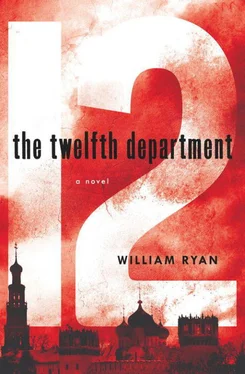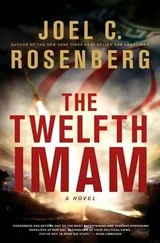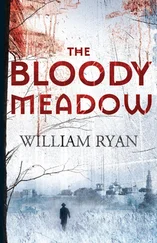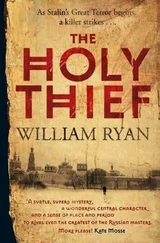“Why not?” Korolev asked, giving her another cigarette and lighting it for her.
“The other residents were nervous of him. He was, well, political.”
“Political?” Korolev asked, considering the slight emphasis she’d placed on the word. “Do you mean he denounced people?”
She nodded, looking to the door once again.
“Did he have anything to do with that sealed apartment on the third floor?”
“They say he did. The other girls in the building. I’ve heard him on the telephone asking for people to be investigated, arrested, that kind of thing.”
The girl exhaled a perfect smoke ring. Not a casual smoker then, for all her initial nervousness.
“But I don’t know about the Golovkins. You’d better ask the doorman about that kind of thing.”
“The Golovkins?”
“That’s the couple who lived on the third floor.”
“I see—and why should I ask the doorman?”
“They call him up when they need a witness—State Security—even for the other buildings in the block. He knows all about that kind of thing.” There was an edge to her voice that confirmed Korolev’s own suspicions about Comrade Priudski. A willing ear for the Chekists, at the very least. Maybe more.
“When were they arrested?”
“Last week, Monday, I think. There were three arrests last week.”
“In this part of the building alone?”
“In the whole building.”
Korolev thought it through, three arrests out of five hundred apartments—quite a high number all the same.
“Is that unusual?”
“No,” she said. “Ever since I came here there have been arrests. But it’s not people like me—it’s people like the Golovkins. Girls like me just go and work for someone else. Unless they get caught without a residency permit.”
She gave him a look that said, I’m being honest with you, Ment , you’d better be honest with me.
“I won’t be bothering you about your permit, I’ve said as much already. Now, what about this morning?”
The professor, it seemed, had left the house at 7:30, as Belinsky had told him, to go to his institute—a short walk away on Yakimanka—then he’d returned at about nine. He’d had some meeting, she thought, but about what she didn’t know, and when he came back he’d seemed distracted, maybe even worried. Again, consistent with what she’d told Belinsky. He’d made a phone call—but to who, she couldn’t say. She’d brought him a pot of coffee at 9:30, as usual—just before she’d left to do the shopping. The only strange thing was that the professor had complained about rats, or mice perhaps. In the walls. He told her he’d been hearing them all morning.
“Rats?”
“I didn’t hear them,” the girl said, helping herself to another cigarette. “But he could be a bit like that. He liked everything just so. You couldn’t have a dog in the building, in case it might bark and the professor be disturbed. Then you’d be in trouble. Big trouble.”
The professor had drunk most of the coffee she’d brought him by the time she returned, and left the pot and the dirty cup in the kitchen.
“What size pot?”
She pointed at a coffee pot drying beside the sink—it wasn’t small.
“So a few cups?”
“He finished most of it, so I’d say yes.”
If she’d left just after she’d brought him the pot of coffee it would have taken the professor some time to drink so much—at least fifteen minutes, would be Korolev’s guess. Which narrowed the period in which the death must have occurred, he supposed.
“So you washed the cup and the coffee pot?”
“And I began to make their lunch.” She pointed to a pile of chopped vegetables. “And then. Well, Comrade Captain, then I found him.”
And she looked away from him, chewing on her lip—her eyes wet.
Korolev and Slivka stood on the landing one flight up from the dead man’s apartment, looking out the open window down onto the street far below, watching the traffic pass over the soon-to-be-destroyed Bolshoi Kamenny Bridge and sucking the smoke out of a pair of Belomorkanals. Korolev could see lightning flicker over the northern suburbs and the shadow of rain underneath the low clouds as they approached. He hoped Yuri wouldn’t be caught outside when the bad weather came.
“What we need is a motive, Slivka,” he said, flicking the papirosa tube out the window and resisting the temptation to light up another. “If we can find one, then like as not we’ll find a murderer attached to it. But the only thing we’ve got to go on so far is that the sealed apartment on the third floor might have been the victim’s doing. It seems he liked to tell tales.”
“I see.” Slivka didn’t seem keen on it as a motive—but, then again, nor was he.
“I know. We’ll have to look into it all the same—I’ll ask Popov for the best way to go about it. What did this doctor say about Comrade Madame Azarova?”
“He said she should be awake soon. We can speak to her about half an hour after that, he thinks.”
“Good, we talk to her as soon as we can. What else?”
Slivka looked down at her notebook.
“The doorman has gone through the list of residents—who was here this morning and what their movements were. Belinsky’s men are going door to door through this part of the building—so we’ll soon add detail to that. No one we’ve questioned so far has heard or seen anything directly related to the murder, but we have two people who say they saw the professor leaving the building early in the morning, which confirms what the maid told you. We’ve also got a list of people who were visiting the building—Belinsky’s men are working their way through them. And they’re also trying to make contact with residents who left for work earlier in the day, in case they might have seen anything.”
Korolev considered this, and found that somehow another Belomorkanal had ended up in his mouth. He lit it.
“Talk to the widow when she surfaces—I’m going to take the car and drive to this institute of his and find out what he was up to there this morning and why it might have upset him. Oh, and I got one more thing out of Matkina—she could smell gunpowder when she went into the study. That—and all the coffee he drank after nine-thirty—suggests he wasn’t shot long before she found the body. Something to bear in mind.”
He turned to lead the way down the staircase and found Priudski, the doorman, standing on the landing below—his ears no doubt having been tuned in to their conversation like a radio receiver.
“Comrade,” Korolev said dryly. Priudski returned the greeting without the slightest trace of embarrassment. Well, Korolev thought, the fellow’s probably just doing his job—the same as he was. Not that this made him any happier.
* * *
Inside the Azarovs’ apartment the forensics men were standing back, watching the burly figure of Zinaida Chestnova carefully lift the dead man’s head in her small plump hands. Gouts of semi-coagulated blood were providing some resistance and her assistant was holding down the paperwork on which the head had rested while Chestnova moved it from side to side. She was careful, almost gentle, but Korolev knew she’d be less gentle when the autopsy proper began. She was looking for hypostasis on the dead man’s face, unless Korolev was mistaken—one of the indicators that might tell her when he’d died.
“Let me guess, Korolev,” Chestnova said, without looking up. “You want me to tell you to the minute, as usual.”
Despite the fug of cigarette smoke, he could smell the corpse’s sweet stench now. The summer heat was having its effect.
“I wouldn’t be so unreasonable. We’ve some ideas, but if you tell us something different then we’ll have to think again.”
Читать дальше












